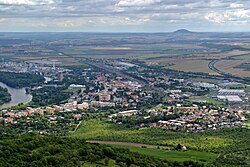Lovosice
Lovosice | |
|---|---|
 Lovosice seen from Lovoš mountain | |
| Coordinates: 50°30′54″N 14°3′4″E / 50.51500°N 14.05111°E | |
| Country | |
| Region | Ústí nad Labem |
| District | Litoměřice |
| First mentioned | 1143 |
| Government | |
| • Mayor | Milan Dian (ANO) |
| Area | |
• Total | 11.89 km2 (4.59 sq mi) |
| Elevation | 151 m (495 ft) |
| Population (2024-01-01)[1] | |
• Total | 8,774 |
| • Density | 740/km2 (1,900/sq mi) |
| Time zone | UTC+1 (CET) |
| • Summer (DST) | UTC+2 (CEST) |
| Postal code | 410 30 |
| Website | www |
Lovosice (Czech pronunciation: [ˈlovosɪtsɛ] ⓘ; German: Lobositz) is a town in Litoměřice District in the Ústí nad Labem Region of the Czech Republic. It has about 8,800 inhabitants. It is an industrial town.
Geography
[edit]Lovosice is located about 6 kilometres (4 mi) southwest of Litoměřice and 16 km (10 mi) south of Ústí nad Labem. It lies mostly in the Lower Ohře Table. A small northwestern part of the municipal territory extends into the Central Bohemian Uplands and includes the highest point of Lovosice, which is a contour line at the foot of the Lovoš mountain at 310 m (1,020 ft) above sea level. The town is situated on the left bank of the Elbe River, which forms the northern municipal border.
History
[edit]
The region of Lovosice was inhabited already in the Bronze Age. Some evidence indicates that the first Czechs lived right here.
The first mention of Lovosice is from 1143. Duke Vladislaus II gave this small village to the Strahov monastery. Emperor Rudolf II promoted the village to a town in 1600.[2]
Lovosice was 1756 the site of a major battle between Prussia and the Austrian empire, at the Battle of Lobositz.
In 1850, the railroad was built, which supported the industrialization of the town and accelerated development.[2]
During World War II, due to the Munich Agreement, Lovosice fell within a German occupation zone, commonly called Sudetenland. Only 600 Czechs stayed in the town at that time.[2] After the war, the German population was expelled as a result of the Beneš decrees.
Demographics
[edit]
|
|
| ||||||||||||||||||||||||||||||||||||||||||||||||||||||
| Source: Censuses[3][4] | ||||||||||||||||||||||||||||||||||||||||||||||||||||||||
Economy
[edit]Lovosice is known as an industrial town with a long tradition of chemical and food-processing industries.[2]
Transport
[edit]Lovosice is a significant transport junction. Besides a cargo port on the Elbe River, the town has a great connection to Prague and Germany via the D8 motorway.
Lovosice is located on the railway lines Prague–Děčín and Litoměřice–Chotiměř. The town is served by three train stations.[5]
Sights
[edit]
The former town hall is one of the most valuable buildings in the town. It was built in the Art Nouveau style in 1906–1907. Today it serves as a library and tourist information office.[6]
The Renaissance castle in Lovosice was built in the second half of the 16th century. After a fire in 1809, it was modified in the Baroque style and served as an archive and office. Today the building houses a secondary vocational school.[6]
The Church of Saint Wenceslaus was built in the Baroque style in 1733–1748, on the site of the former wooden church. It contains valuable frescoes and a Saint Wenceslaus altarpiece.[6]
Notable people
[edit]- Karl von Czyhlarz (1833–1914), Bohemian-Austrian jurist and politician
- Alfons Dopsch (1868–1953), Austrian historian
Twin towns – sister cities
[edit] Coswig, Germany
Coswig, Germany
References
[edit]- ^ "Population of Municipalities – 1 January 2024". Czech Statistical Office. 17 May 2024.
- ^ a b c d "Historie města Lovosice" (in Czech). Město Lovosice. Retrieved 18 July 2021.
- ^ "Historický lexikon obcí České republiky 1869–2011" (in Czech). Czech Statistical Office. 21 December 2015.
- ^ "Population Census 2021: Population by sex". Public Database. Czech Statistical Office. 27 March 2021.
- ^ "Detail stanice Lovosice" (in Czech). České dráhy. Retrieved 2 June 2024.
- ^ a b c "Město Lovosice" (in Czech). Město Lovosice. Retrieved 18 July 2021.
- ^ "Aktivní partnerství: komunikace, důvěra, spolupráce" (in Czech). Město Lovosice. Retrieved 17 August 2020.



